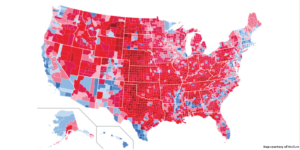
Map showing how counties voted in the 2016 presidential election (Republican Party shown in red; Democratic Party shown in blue) Map courtesy of Medium
The divide in American politics is widening rapidly. This is a fact that many Americans have come to understand and even accept as they themselves contribute to the escalating tension between Republicans and Democrats. Some political psychologists such as Lilliana Mason claim that members of one political party dislike the supporters of the other mainly because these individuals are simply in the opposite party, not because of disagreements over specific issues. It is this bond that a supporter feels to their political party that convinces them that they have opposing views, causing the beliefs of political parties to become more extreme.
In order to close the divide in U.S. politics and increase support for compromise and collaboration, the citizens and politicians of the U.S. must make it a priority to educate themselves on current issues and, more importantly, to listen to and consider the perspectives of the other party Many Americans may be surprised to discover that they share similar opinions with those who they may have otherwise disregarded as merely an ignorant Republican or Democrat.
For example, an individual may identify as a Republican primarily because they believe that their views regarding taxes and foreign policy best align with that of the Republican party. However, this same individual may also support abortion rights, gay rights, liberal immigration reform, and racial justice — all viewpoints most Americans would say are Democratic beliefs. In the same way, someone may associate themselves with the Democratic party because they believe their views regarding gun control are shared by the Democratic party, yet this individual may also oppose gay marriage and abortion rights. The people of the United States of America must hold themselves accountable to identify what the actual views of election candidates are, regardless of political party.
It is true that the current political climate undoubtedly exacerbates polarization in U.S. politics by stirring confusion about what it means to be a Republican or Democrat. Many individuals feel that they can’t identify as a moderate Republican because President Trump is so extreme; on the other hand, moderate Democrats feel lost in a trend of extreme liberalness. One must understand that an individual’s definition or idea of a Democrat or Republican may be quite different from another’s; generalizations should not be made based solely on these notions.
Hopefully the next time U.S. citizens vote, they will choose politicians who they believe are the best options for improving the nation, not just their party favorite.




